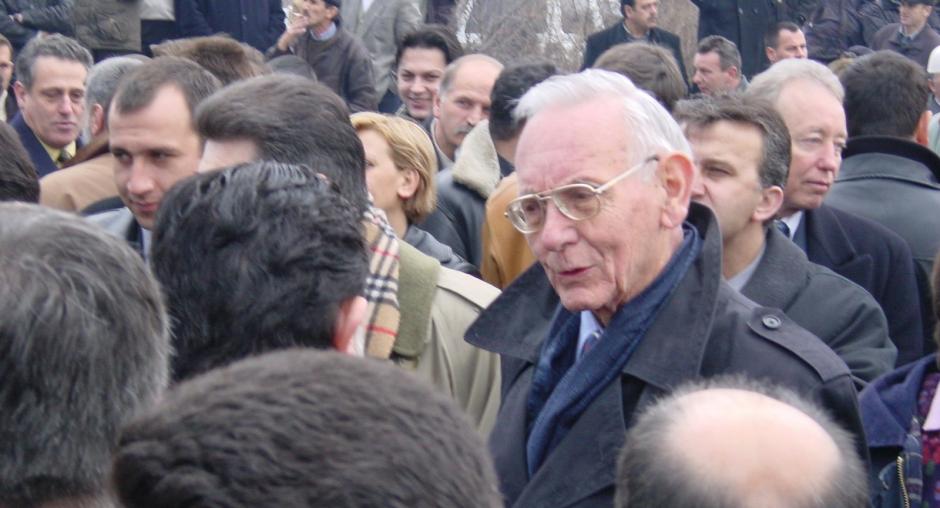Stories
Eight years of preventing ethnic conflict
22 June 2001
A man who has personified the OSCE maxim of conflict prevention for eight years is stepping down at the end of June 2001. Max van der Stoel has been OSCE High Commissioner on National Minorities since the post was created in 1992. This ends a remarkable period in which the former Dutch Foreign Minister (aged 76) has been on the road almost non-stop since his office opened in the Hague in January 1993.
A key issueSmall arms and light weapons are the weapons of choice in today's internal conflicts. These arms are cheap, portable, long-lasting and widely available around the world. The United Nations estimates that there are currently 500 million small arms in circulation.
In November 2000, the OSCE Ministerial Council endorced the Document on Small Arms and Light Weapons, which sets concrete norms, principles and measures to be followed by OSCE participating States on the issue of small arms and light weapons, including information exchange on the export and import of weapons.
The implementation of the Document is currently a priority for OSCE participating States.
Classic example of quiet diplomacy
The mandate describes the High Commissioner as 'an instrument of conflict prevention at the earliest possible stage'. His role has been to identify - and seek early resolution of - ethnic tensions that, in his opinion, could endanger peace, stability or friendly relations between OSCE participating States.
Mr. van der Stoel's approach is seen as a classic example of quiet diplomacy. His confidential and co-operative style has kept him out of the limelight, but has proved effective in containing and de-escalating tensions. As one observer has put it, "he will be remembered for what didn't happen. He kept the dogs from barking."
Early warning, early action
The High Commissioner's task was to provide early warning on potential ethnic conflicts. This was usually followed by early action to head off a worsening of the situation.
In his last speech to the OSCE Permanent Council as High Commissioner on National Minorities, on 22 June 2001, Mr. Max van der Stoel stressed the importance of early action saying: 'A concerted response by the international community must be resolute, targeted and timely. If we do not respond effectively to the early signs of trouble, precious time will be lost. And sometimes so much damage is done in the interim that the possibility of preventing conflicts becomes very slim indeed'.
He has often stressed the need for investing in projects and initiatives to prevent conflict and improve inter-ethnic relations. He subscribed to the old adage that 'an ounce of prevention is worth a pound of cure'.
"On" not "for" national minorities
Mr. van der Stoel often made the distinction that he was the High Commissioner "on" rather than "for" National Minorities. His goal was to ensure that minority rights were protected. At the same time he understood the importance of being sensitive to the majority's position. As he once remarked, "my goal is to get Governments to stretch the bounds of the politically possible while convincing minorities to move away from maximalist positions."
He believed that minority and majority interests are not mutually exclusive. One can protect and promote one's national identity without threatening the rights of others. Self-government can be achieved without breaking up the state. And one could use one's language and enjoy one's culture while being integrated into a multi-ethnic society. These views are elaborated in his recommendations and speeches.
Keeping multi-ethnic States together
Mr. van der Stoel often spoke out against extreme nationalism. He also warned against giving up on the multi-ethnic state. As he said in a recent speech: "If we were to have a Europe where every nation lives in 'its own' State, we would have an endless redrawing of boundaries, a steady stream of population transfers, and peoples living in culturally exclusive environments. If this is nationalism's Utopia, it is not a place where I would want to live."
When he received the Hessische Peace Prize on 20 June, Mr. van der Stoel said "I am under no illusions that all inter-ethnic conflicts can be solved. However, I do not believe inter-ethnic conflict is inevitable. We now have a better understanding of why conflicts erupt and how they can be prevented. Standards are in place to protect minority rights and there is a growing 'toolbox' of techniques to prevent conflict."
"We still need to do a lot more in terms of investing in conflict prevention, acting on the signs of early warning, and shoring up the foundations of multi-ethnic States. . . The last century, indeed the last decade, has given us enough warning of what happens if we fail."
A successful instrument of conflict prevention
In recent years, Mr. van der Stoel's work has won considerable acclaim. He has received high honours and decorations from a number of OSCE participating States. He also holds several honorary doctorates.
A new book entitled Quiet Diplomacy in Action: the OSCE High Commissioner on National Minorities gives an in-depth, behind the scenes look at the High Commissioner's work. For more information and an order form click here (PDF format).
Mr. van der Stoel will be succeeded by the Swedish diplomat, Rolf Ekeus, who will begin his term of office on 1 July.

